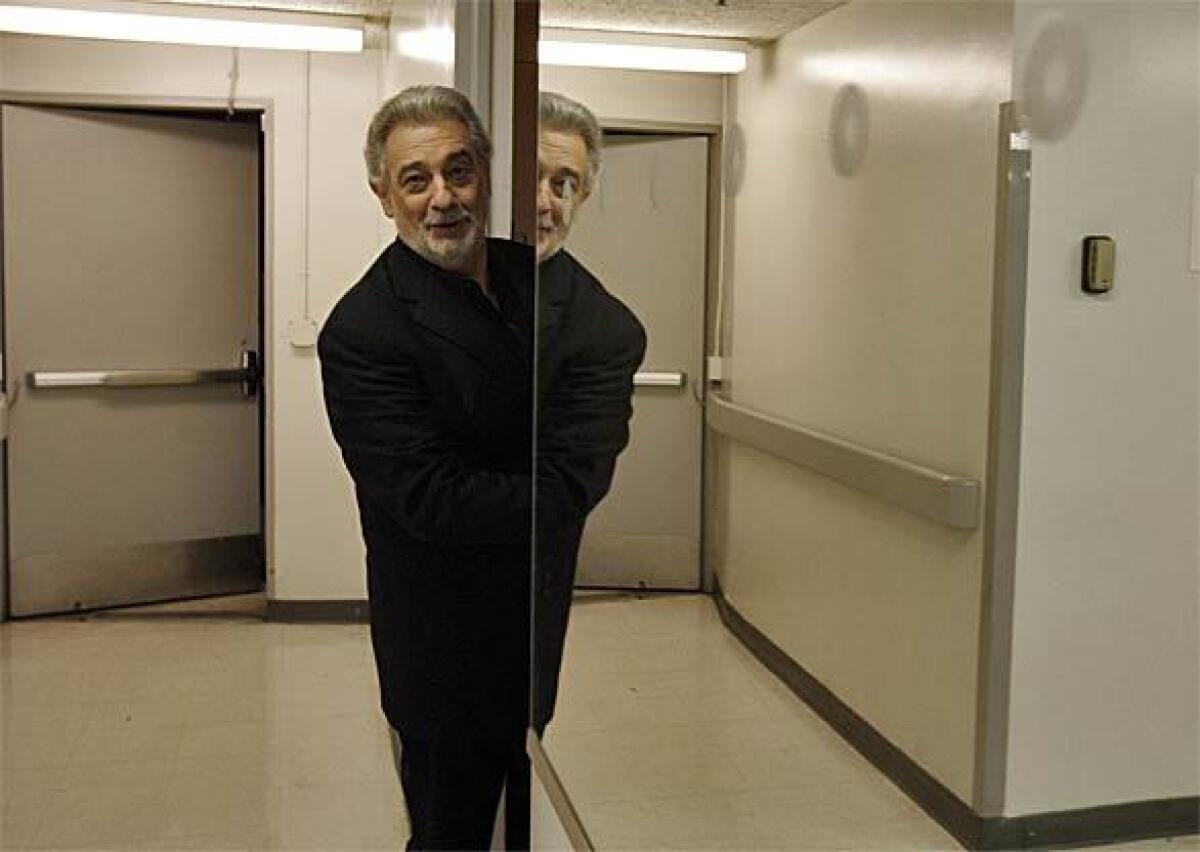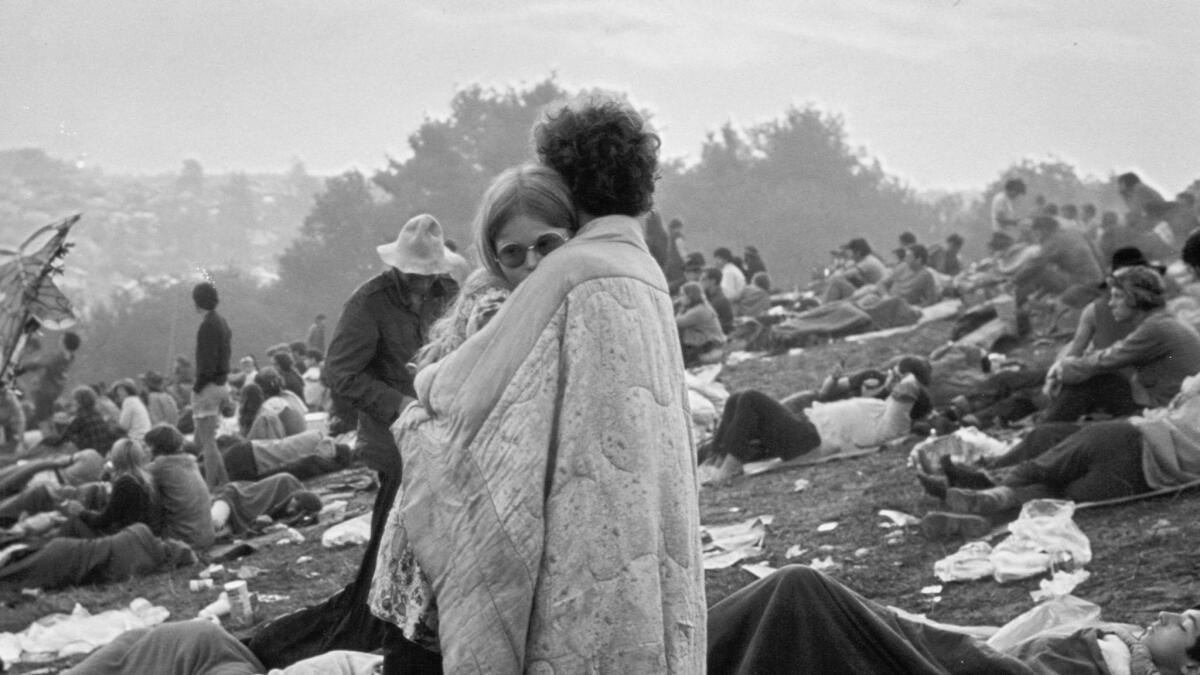After Plácido Domingo harassment allegations, readers ask: ‘Who is complicit?’

- Share via
L.A. Opera must act
Regarding “Doubts About Opera Star Inquiry” [Sept. 4] and “Pressure Increases as More Domingo Allegations Surface” [Sept. 6] by Jessica Gelt: As a longtime Los Angeles Opera subscriber, I was disgusted by L.A. Opera’s tepid response to the allegations about Plácido Domingo’s long history of sexual harassment brought to light last month.
Now [come] reports that 11 more women have accused Domingo of sexual harassment, that Domingo’s predatory behavior was common knowledge at L.A. Opera, and that administrators at L.A. Opera looked the other way.
That the administrators at L.A. Opera continue to stand by and protect Domingo is unacceptable. That the L.A. Opera board members and James Conlon, music director at L.A. Opera have chosen to remain silent is also unacceptable.
The time for powerful men to stick together and protect each other has long passed. The women sexually harassed by Plácido Domingo deserve better. We all deserve better. L.A. Opera needs to do the right thing.
Aneil Rallin
Aliso Viejo
::
Are you complicit? Remember this expensive cover-up is being paid for by ticket sales and donations to L.A. Opera. And it’s taking away needed money for the arts.
Jay Galbraith
Los Angeles
The iconic Linda Ronstadt

Regarding the Linda Ronstadt profile “No Surrender” by Amy Kaufman [Sept. 8]: Ronstadt has been an iconic force in music since the release of “Different Drum” with the Stone Ponies. The only error in Sunday’s article is Linda’s assertion that “[s]he didn’t know how to sing for the first decade of her career.”
Well, if you listen to her first three solo albums on Capitol Records, you realize that she knew precisely how to sing. These albums are all terrific. It was the label’s executives who really didn’t know how to listen.
Which is how Asylum Records was lucky enough to offer her the keys to the kingdom, which she grabbed and never looked back.
Gary A. Sernaker
Solana Beach
::
Thank you for your article on Linda Ronstadt. I’ve always been a fan of of hers and coincidentally just finished her autobiography a few days ago. In reading it, I was struck by her command of language, a sure sign of someone who is intelligent and well read, and her true moral and ethical compass, a testament to an strong extended family.
Her humility was also refreshing but, in spite of her view that she is not worthy of all the accolades, I believe she is one of the best, if not the best female vocalists of my generation. Her phrasing, the emotion she conveys and her vocal range are unparalleled.
I am happy to know that she is still surrounded by music even though she no longer sings and hope that it allows her heart to soar. She certainly deserves that for all the times that she made our hearts soar.
Marshall Eichenauer Jr.
Laguna Beach
::
Thank you for this intimate discourse with Linda Ronstadt. There’s a generation or two of us who loved her “sounded like a goat” voice from the 1960s all through our childhood, adolescence and adulthood. She still resonates with so many calling her a main influence for their art of voice.
I had posters of her on my bedroom walls, the sounds of her in my car stereo and many of her vinyls and CDs. She came along with me through the 1970s, ’80s and ’90s, but I never got to be under her spell in a live performance. My major regret is not buying a ticket to the Arrowhead Pond in the 2000s when she still toured. She will always be the one performer who got away.
I will be there buying a ticket next week as “Linda Ronstadt: Sound of My Voice” premieres.
Theodore P. Schraff III
Laguna Beach
‘Country’ praise and quibbles

Regarding Randy Lewis’ article [“What Is Country? Yesterday ... Today ... Tomorrow” Sept. 8]: When the folk music craze hit college campuses in the 1960s, I had already come to regard country music as “backward.” To me, it was hillbilly music. But an English professor who grew up in South Carolina noted that folk and country music had one important thing in common. Besides being straightforward and uncomplicated, both possessed an almost heart-rending authenticity. In the span of two short sentences she basically destroyed one of my prized beliefs. I hate when that happens.
David Macaray
Rowland Heights
::
I have watched portions (not all) of the [Ken Burns documentary series “Country Music”] on public television and read advance pieces. I am surprised to find my favorite country and western singer for the last 25 years, George Strait, seems to be ignored almost completely in coverage of this documentary. And Kris Kristofferson, writer of my three favorite songs, “Sunday Morning Coming Down” (sung by Johnny Cash), “For the Good Times” (sung by Ray Price) and “Help Me Make it Through the Night,” doesn’t seem to get much notice either.
Patricia M. Wolfe
Los Angeles
Decorum vs. enjoyment
Regarding Ashley Lee’s “A Shush That Spoke Volumes” [Sept. 5]: Bravo to Ms. Lee’s reaction to the older male jerk who neither saw, heard nor understood the play enough to appreciate the gasps and laughter of the women in the audience and shushed them with “It’s just a play, folks, relax.”
That’s the reaction good plays get when life’s circumstances are well portrayed by author, director, actors.
Also, the gentleman seems to be what the #MeToo movement is all about: males silencing women. Good for you, Ms. Lee, in suggesting, “I will relax by watching more theater and reacting as I damn well please.”
Jacqueline A. Melvin
Sherman Oaks
::
Granted, a play’s every performance is unique, involving as it does audience as well as cast members. William Shakespeare knew and arguably encouraged audience reaction. That said, there is something to be said for theatrical decorum, fostering a theater environment respectful of the sensibilities of all theatergoers.
At a recent performance of a prominent play, my wife and I, along with others in the audience, were disappointed by the continuous commentary by a gentlemen a few rows from us. When finally someone took the man to task, an altercation all but broke out, illustrating how, especially in today’s charged political environment, audience reaction can become audience interaction. Which was not, in the case of the performance we attended at any rate, what the play’s director, not to mention the audience, had in mind for the evening.
Jeff Denker
Malibu
::
Live theater is a visceral, communal experience. Like any live thing, theater mutates and changes in the process of living. What’s more, the audience is an essential organ of the theater. Together we — theater artists and theatergoers — bring this ancient art form to life.
Let no one stunt its aliveness.
Ben Miles
Huntington Beach
Recalling Chicago’s past
Regarding Carolina Miranda’s interview with artist Judy Chicago [“Colorful L.A. Roots,” Sept. 7]: Judy Chicago says, “I was being erased from the history of Southern California art,” and Miranda writes, “The launch of the Pacific Standard Time series of exhibitions in 2011 helped to resurface some of her early work.”
These statements are misleading. While the PST shows did help, the process of publicly showing Chicago’s historic work was already well on its way in the 1990s.
As curator of “Sexual Politics: Judy Chicago’s ‘Dinner Party’ in Feminist Art History,” a 1996 exhibition at the UCLA/Hammer Museum, I included a number of Chicago’s early works along with works by over 50 other feminist artists from different generations and backgrounds. In fact, at that time The Times has itself erased a very important show in the trajectory making Chicago’s work more visible to the mainstream art world. This show took place in Los Angeles and was heavily — negatively — covered and reviewed by the paper, so this seems very unfortunate for The Times to ignore it now.
Amelia Jones
Los Angeles
Further reading: Jones is correct that Times art critic Christopher Knight panned “Sexual Politics” in 1996, to the consternation of some of our readers at the time and UCLA art history professor Donald Preziosi, who wrote a rebuttal letter. In addition to that review, then-Times art writer Suzanne Muchnic assembled a panel of women in the art world, including artist Judy Fiskin, art historian Libby Lumpkin, performance artist Rachel Rosenthal and Jones. Their discussion on feminist art makes fascinating reading.
Dorian was the real drama
I had a completely different take from Lorraine Ali on the coverage of the recent CNN Climate Town Hall [“Storms Swirl Around Climate Change,” Sept. 6]. I found the breaks for updates on Hurricane Dorian not a distraction but completely appropriate. Where she objected to candidates using extreme terms to stress the urgency of the climate crisis before us, I was relieved to see our leaders finally understanding what we are facing. Where she felt that social media discussion of the Sharpiegate incident, where the president displayed an incorrect map, took our focus away, I found that it highlighted the stark divide between an entire field of candidates concerned about a serious issue and an uninformed, incompetent and uncaring president.
I understand that the lack of political theater and of “reality show-worthy insults or personal attacks” Ali refers to might on the surface take away from the entertainment value. But unfortunately the hurricanes, wildfires, extreme heat waves, health impacts, droughts and fights over land and water of the past few years offer real drama and heartbreak.
Mary Byrd
Santa Barbara
::
I respect the work of TV critic Lorraine Ali, but I think many of her comments on CNN’s “Global Warming Town Hall” missed the point.
It was refreshing to watch candidates have more than a minute to explain complex ideas with energy and passion. Senators Warren and Sanders, in particular, were impressive. The question, from various informed people, were all interesting.
True, there was no hyped-up arguments, no name calling, no shouting. Thank goodness.
Phil Brimble
Los Angeles
Spoiler alert
Regarding Susan Straight’s review of “Atwood’s Powerful Testament” [Sept. 8]: It would certainly have been better if Susan Straight had, in her detailed description of Margaret Atwood’s new novel, [“The Testaments”], given Atwood’s readers the courtesy of discovering the details and plot points themselves upon reading the book.
Instead, in her long and detailed review she has revealed entirely too much of the plot, the characters and their histories. There should have been a spoiler alert at the beginning of the review to warn readers who wish to find out about the contents of the novel on their own when they read the new book.
I am such a reader, and as soon as I discovered how much information was included in the review I immediately stopped reading.
Joann Davis
Los Angeles
It’s like they’re half the population
[With] its front page featuring “Lana Del Rey’s Critical Lesson” [by Mary McNamara], “An Ode to Female Empowerment” [by Jen Yamato on “Hustlers” director Lorene Scafaria] plus [Carolina Miranda’s story on] Judy Chicago’s new show, Saturday’s Calendar section might strike the casual reader as perhaps having been repurposed by NOW (National Organization for Women).
Jeff Denker
Malibu
‘Peanut Butter’ lure
Regarding “Shia LaBeouf Will Break Your Heart,” Katie Walsh’s review of the movie “The Peanut Butter Falcon” [Aug. 9]: As a peanut butter addict since childhood, “The Peanut Butter Falcon” caught my attention by virtue of the title alone.
What a fantastic movie. Great scenery, snappy pace, terrific acting all around. The young man who played the Falcon (Zack Gottsagen) was a delight. He had a deep, throaty voice that lent gravity to his performance. I’d love to see Hollywood make more movies relying on unique characters and situations. Kudos to the writers, actors, director and all who contributed to this bona fide charmer.
Robert Richards
Canyon Country
‘Downton’ appropriation?
Regarding “Passion and Perfect Timing” by Emily Zemler [Sept. 1]: The enormous hype for “Downton Abbey: The Movie” has begun behind a veil of secrecy as thick as that of the Manhattan Project. Yet I can predict the following crucial scene will be in the film: During the visit of the king, a household maid will unexpectedly go into labor, throwing the evening into chaos. Why do I think this?
The famous scene in the “Downton Abbey” TV series in which the Dowager (Maggie Smith), judging a rose contest, selflessly awards the prize to a simple farmer, rather than to herself, is lifted in its entirety from the 1942 William Wyler film “Mrs. Miniver.”
I expect something similar will be appropriated from an old episode of “Upstairs, Downstairs” in which, during the king’s visit, a chambermaid goes into labor.
William D. Santoro, M.D.
Santa Barbara
‘Woostruck’ and proud

Regarding “Calendar Feedback: Hippies Are Back in the Discussion” [Aug. 25]: I read with much interest and some disappointment the various letters people wrote in response to a negative article about Woodstock [“The Hippie Reckoning,” Aug. 18].
What I cannot understand is why all the other pop culture eras are embraced and taken more seriously (the ’30s, ’40s, ’50s and ’80s) but everyone screams, “The ’60s are over, the ’60s are over” like it’s a deadly disease to be avoided.
I am fed up with the lack of respect for the ’60s and the ’70s. Some of the greatest music ever to be laid on vinyl and some of the best art and fashion ever designed were from the ’60s and ’70s, and for me, no, the ’60s are not over. I may be “Woodstruck” but I’m wholeheartedly proud of it. I revel in the sweet memories of it all.
In these insane Trumpian times, there’s no place else I’d rather be.
Jodi Lawson
Burbank
Hmmmm .... doughnuts
Did anyone else notice that the photo of a curvaceous wood sculpture [“Woodworking Coded,” Sept. 8] bears an uncanny resemblance to a giant glazed doughnut?
Well, my stomach and I did. That’s why we’re headed to a doughnut store, for warm glazed doughnuts and fresh cold milk.
David Tulanian
Las Vegas
More to Read
The biggest entertainment stories
Get our big stories about Hollywood, film, television, music, arts, culture and more right in your inbox as soon as they publish.
You may occasionally receive promotional content from the Los Angeles Times.










